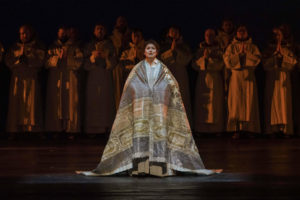
Opéra National de Paris 2022-23 Review: La Forza del Destino
Put Simply, Anna Pirozzi & Russell Thomas Lead the ‘Best Production’ of the Season
By João Marcos CopertinoIn very direct terms: Paris’s “La Forza del Destino” is the best production of the opera company this season so far. The success is living proof of the golden rule of opera: great music with great musicians make opera (always) great. It seems to be an easy rule, but it is often forgotten.
“La Forza” is an Opera with capital “O,” with drama at the highest level: murder, conversion, war. It is a melodrama to make the life of any Mexican telenovela protagonist easy. Jean-Claude Auvray’s staging (revised by Stephen Taylor) is rather successful in making such a plot compelling as a criticism of violence and social oppression. To do so, he transferred the action from eighteenth-century Seville to 1850s Spain and Italy.
Curtains
The transposition seems rather subtle compared to others nowadays—Paris recently put “La Bohème” on a spaceship — but still works. Beyond the big dresses and the insane wars of the nineteenth century, what remains is a sense of a society continuously facing the unsustainable state of its illusions of how things are meant to be. The set design of Alain Chambon continuously plays with the opening and closing of many curtains.
The Vargas’ house in Sevilla is merely a set of curtains to be torn down by the death of its patriarch; Don Alvaro sings his third act aria with a curtain following him. The Theater is, then, a social projection, but also a protection. Dona Leonora’s conversion implies her being rescued by a sort of curtain with the images of Christ.
The singers, apart from the great Russell Thomas (more on that later), sang their roles as if they were these archetypical characters. Their suffering was inherently linked to a society that glorifies war (“Viva la Guerra” is written on the curtains), and often prevents them from truly living their lives on their own terms. The acting, then, is operatic to the fullest, on the one hand, seizing much inner psychology from the actors, and, on the other, pledging abnegation or death as the fate of all the characters.
But if the scenic achievements of the production were great, the musical merits were perhaps even greater.
Great Musical Heights
For the first time this season the Paris Opera orchestra did not cover its singers. The credit goes to the efficient conducting of Jader Bignamini and the casting of singers eminently suitable to their roles. But more on Bignamini: he allowed the singers to do their job so well that I couldn’t help but wonder why there weren’t more conductors like this nowadays. Generous tempi for the singers to phrase. Drama, language, and music worked together in a great pace.
On the first night, Anna Pirozzi replaced an ill Anna Netrebko. She’s an impressive Leonora and managed her first-act aria “Me pellegrina ed orfana” well. Her voice is big and sharp but with a clarity that preserves the comprehensibility of the text. When ending her great “Pace, Pace mio dio,” Pirozzi mesmerized the entire audience with her “Maledizione.” It was so striking that an odd soprano voice in the audience tried to mimic Pirozzi’s high B during the applause—it was more funny than beautiful, but it is nice that an audience is that engaged. It is Verdi’s melodramma after all.
Russell Thomas is an amazing tenor, possessing a consistent voice with a compelling scenic presence. His lyric spinto tenor has uniformity in all tones and his unique vocal approach has the effect of highlighting the difference between Alvaro and every other character. Moreover, Thomas managed to be a more sober presence in such a melodramatic night. He sang as if he were commenting on such a situation more than dramatically living it. His performance induced the audience to think through the ideas of social projections and illusions more thoroughly.
Ludovic Tézier, as expected, was a wonderful Don Carlo. Aligned with the dramatic approach of Pirozzi, his Don Carlo was mean even when he pledged fidelity to Thomas. In this approach the characters might not have such deep inner psychology to explore, but their voices are striking. Tézier’s Don Carlo is rather inflexible in his view of the world; his conviction is such that he does not feel the need to convince anyone. Tézier vocally embraced such entitlement so well that it was difficult not to melt down with his voice. His aria in the third act showed impressive command of phrasing and breathing. All the rallentando were mastered to perfection.
The rest of the main cast— Elena Maximova, Feruccio Furlanetto (!), and Nicola Alaimo—also have the voices of great singers and were all in great shape. It was, indeed, a night of musical excellence. There was no singer that did not do their work at a truly high level.
Just one small odd thing: the prelude was played not to open the night, but between the first and the second act. I wondered if this was a deliberate scenic decision or a matter of musical score. Nevertheless, someone in the audience cried “É Tarde,” in good Italian, and whoever it was, they were not wrong.


